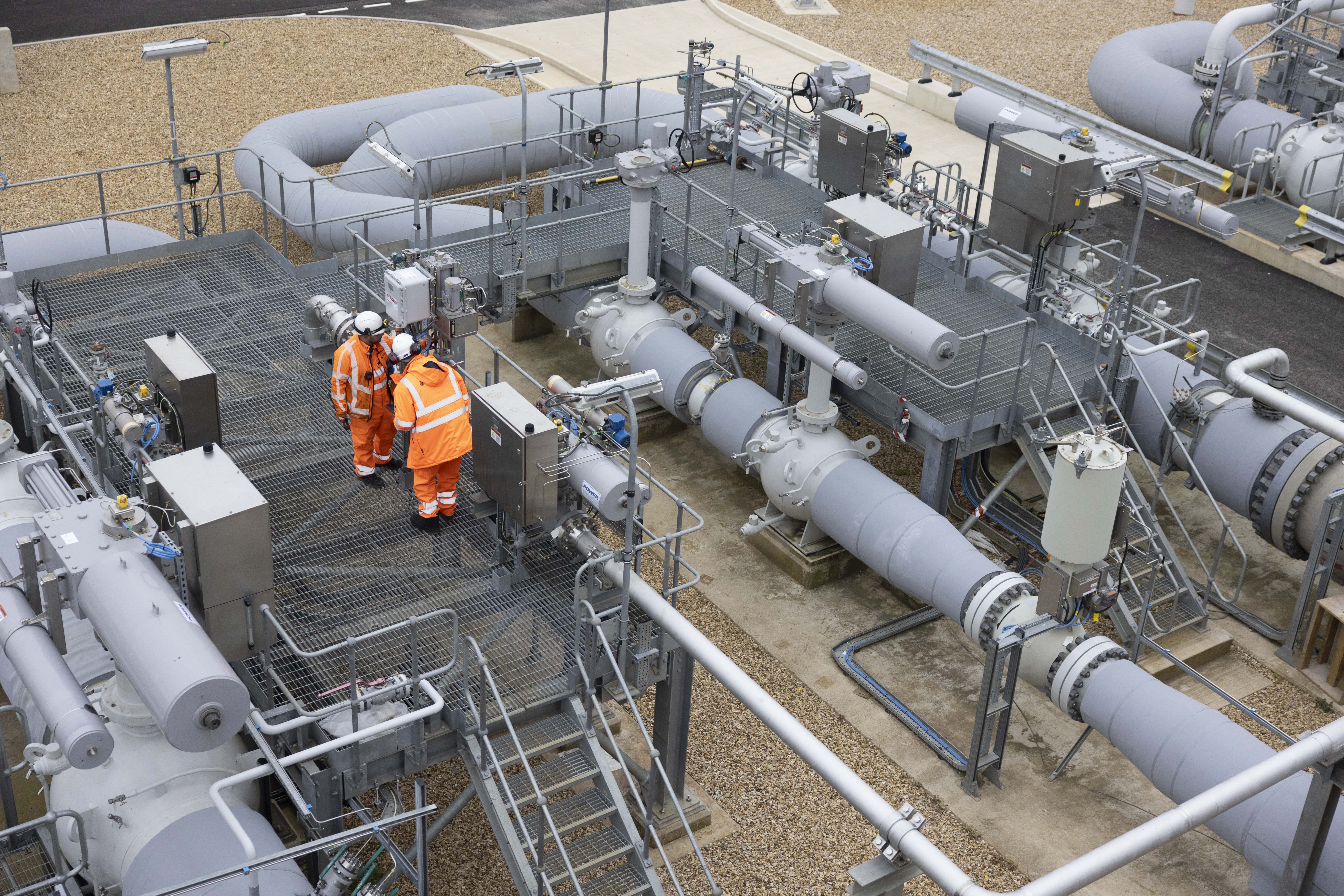Connections

Understand how to apply for a connection or reserve capacity on the gas National Transmission System (NTS)
The NTS and connections
The NTS transports natural gas around Great Britain at high pressure via thousands of miles of pipeline. It transports gas to major end users such as power stations, large industrial plants and storage sites, as well as to the Gas Distribution Networks (GDNs) which, in turn, transport gas to homes and businesses across the country. The NTS also transports gas to interconnectors, which transport gas to the European continent and the island of Ireland.
Gas is injected into the NTS from a number of sources, including the North Sea gas fields, Liquefied Natural Gas (LNG) terminals, interconnector pipelines from Europe, biomethane plants and gas storage facilities.
Gas enters and exits the NTS at connection points.
If you wish to connect to the NTS, there are three types of connection you can apply for:
- Entry: A connection enabling you to inject gas into the NTS.
- Exit: A connection enabling you to take gas off the NTS.
- Storage: A connection enabling you to both take gas off the NTS and inject gas back into it.
Connections can be further sub-divided (where suitable) into:
- Standard Design connections, and
- Bespoke connections.
Find out more about the connection process and how to apply.
Contact National Gas connections
To find out more about connecting to the gas National Transmission System (NTS), please contact us.
Home and business connections
National Gas only manages direct connections to the high-pressure National Transmission System (NTS). The NTS transports gas to the regional Gas Distribution Networks (GDNs).
If you are a homeowner or a business, you will need to approach the GDN for your area. You can find out who your GDN is, and how to contact them, by entering your postcode on the button below.
Connections Document Library
Access a full suite of connections documents, including updates on Non-Standard Gas Quality parameters at proposed new entry connections, by clicking the link below
Reserving NTS capacity
National Gas provides for shippers or developers who wish to reserve entry or exit commercial capacity rights on the NTS for projects that are in development, by way of the Planning & Advanced Reservation of Capacity Agreement (PARCA).
Capacity reserved via a PARCA will need to be allocated to a Nominated NTS User (NTS Shipper User or DNO User) at the appropriate time. To reserve capacity on interconnector pipelines, you must use the Capacity Allocation Mechanism (CAM).
Find out more about reserving capacity.
NTS diversions
If you are planning to carry out any construction or infrastructure work near to a gas pipeline, you must contact National Gas for advice. In some circumstances, it may be necessary to divert the pipeline. NTS pipeline diversions can be complex and costly, so we aim to avoid the need for diversions wherever possible.
Find out more about the pipeline diversion process and who to contact.
Understand how to apply for a connection or reserve capacity on the gas National Transmission System (NTS)
The NTS and connections
The NTS transports natural gas around Great Britain at high pressure via thousands of miles of pipeline. It transports gas to major end users such as power stations, large industrial plants and storage sites, as well as to the Gas Distribution Networks (GDNs) which, in turn, transport gas to homes and businesses across the country. The NTS also transports gas to interconnectors, which transport gas to the European continent and the island of Ireland.
Gas is injected into the NTS from a number of sources, including the North Sea gas fields, Liquefied Natural Gas (LNG) terminals, interconnector pipelines from Europe, biomethane plants and gas storage facilities.
Gas enters and exits the NTS at connection points.
If you wish to connect to the NTS, there are three types of connection you can apply for:
- Entry: A connection enabling you to inject gas into the NTS.
- Exit: A connection enabling you to take gas off the NTS.
- Storage: A connection enabling you to both take gas off the NTS and inject gas back into it.
Connections can be further sub-divided (where suitable) into:
- Standard Design connections, and
- Bespoke connections.
Find out more about the connection process and how to apply.
Contact National Gas connections
To find out more about connecting to the gas National Transmission System (NTS), please contact us.
Home and business connections
National Gas only manages direct connections to the high-pressure National Transmission System (NTS). The NTS transports gas to the regional Gas Distribution Networks (GDNs).
If you are a homeowner or a business, you will need to approach the GDN for your area. You can find out who your GDN is, and how to contact them, by entering your postcode on the button below.
Connections Document Library
Access a full suite of connections documents, including updates on Non-Standard Gas Quality parameters at proposed new entry connections, by clicking the link below
Reserving NTS capacity
National Gas provides for shippers or developers who wish to reserve entry or exit commercial capacity rights on the NTS for projects that are in development, by way of the Planning & Advanced Reservation of Capacity Agreement (PARCA).
Capacity reserved via a PARCA will need to be allocated to a Nominated NTS User (NTS Shipper User or DNO User) at the appropriate time. To reserve capacity on interconnector pipelines, you must use the Capacity Allocation Mechanism (CAM).
Find out more about reserving capacity.
NTS diversions
If you are planning to carry out any construction or infrastructure work near to a gas pipeline, you must contact National Gas for advice. In some circumstances, it may be necessary to divert the pipeline. NTS pipeline diversions can be complex and costly, so we aim to avoid the need for diversions wherever possible.
Find out more about the pipeline diversion process and who to contact.

